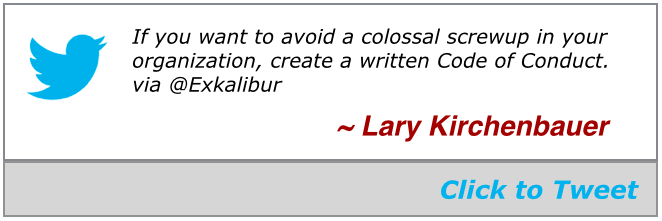Have you established a written Code of Conduct in your organization? O ur prescriptions for acceptable behavior are too vague. Get started now to spell it out more clearly to avoid that potentially colossal screwup.
Have you heard this phrase before?
“Conduct unbecoming”
You may have heard this phrase from the clenched teeth of a military JAG officer about the same time you learned that “Crystal” is a perfectly apt response to “Are we clear?”
Throughout my service as a U.S. Army officer, this phrase was constantly refreshed as the highest standard to apply to the official actions of military officers.
How Do Organizations Define Acceptable Behavior?
The complete phrase is contained in Article 133 of the Uniform Code of Military Justice (UCMJ):
“Any commissioned officer, cadet, or midshipman who is convicted of conduct unbecoming an officer and a gentleman shall be punished as a court-martial may direct.”
If you have some difficulty associating an officer of the Armed Forces with being a “gentleman,” it may be because soldiers are more easily seen as “warriors”. The term “gentleman” is more often associated with a three-piece suit, courtly manners and a snifter of cognac in hand.
Be assured, however, that the U.S. Military takes it very seriously.
How Do You Deal with the Misadventures of Your Colleagues?
Why do I bring this up?
Almost every day, I see executives wrestling with the misadventures and ethical shortcomings of employees and fellow executives.
They witness embarrassing infractions and misguided actions that are unacceptable to them, yet they don’t neatly fit within a “don’t lie, cheat or steal” framework. We’ve recently shared some thoughts about how to deal with the Certified Jerks in our organizations, so you know what we’re talking about.
Is there a code of conduct in your organization that prescribes the guidelines of personal responsibility and ethical behavior?
Take note that in a digital world, these breaches can become even more important when a momentary lapse quickly becomes a public embarrassment.
We Humanoids have an Unlimited Repertoire of Misbehavior
The vagaries of human behavior are boundless, and because they are equally unpredictable, we struggle to erect the appropriate guardrails to define acceptable conduct.
The results are a plethora of vague invocations that rhyme with something that doesn’t pass the “smell test” … or “I’ll know it when I see it”.
The challenge is that for a code of conduct, we understand the spirit far better than the letter.
We’re working hard to provide practical strategies, tools and tips to help you become a More Effective Leader. Check out the Featured Articles in our Leadership Library.
How Vague is “we deem ourselves insecure”?
In my earlier CFO days, we constantly tussled with our bankers over a similarly fuzzy phrase like conduct unbecoming.
After negotiating all of the detailed affirmative and negative covenants in a loan document, one final phrase … usually written something like
“the bank deems itself insecure” …
always appeared as the final covenant that, if broken, opened the door to a loan violation.
We spent hours wrangling over the definition of the phrase “deemed insecure”, and why the multipage list of covenants was insufficient without that final conundrum. We rarely reached an agreement on its definition.
Our Prescriptions are Vague
By now, you can see why phrases like “deemed insecure” and the “smell test” are blood brothers of “conduct unbecoming” can’t you?
The UCMJ tries to minimize this uncertainty by attempting to define “conduct unbecoming”.
It refers, for example, to
“action or behavior in an official capacity which, in dishonoring or disgracing the person as an officer, seriously compromises the officer’s character as a gentleman….”
What Moral Attributes do Officers & Gentlemen have in Common?
It also identifies certain moral attributes common to the ideal officer and the perfect gentleman,
“a lack of which is indicated by acts of dishonesty, unfair dealing, indecency, indecorum, lawlessness, injustice or cruelty.”
These are high but imprecise standards to be sure. Some of those attributes are obvious …
- knowingly making a false statement,
- cheating on an exam, or
- being drunk and disorderly in a public place.
What About “Moral Turpitude”?
Another frequently invoked phrase relates to “moral turpitude”.
The UCMJ continues its attempt to define “conduct unbecoming” …
“committing or attempting to commit a crime involving moral turpitude”
You’ll find many efforts to define moral turpitude, but that phrase also struggles to clearly describe the boundaries of acceptable behavior.
In general, the phrase includes conduct contrary to community standards of justice, honesty or good morals … and legally, refers more harshly to actions with an inherent quality of
“baseless, vileness or depravity with respect to the person’s duty to another or to society in general.”
What are You Going to Do in Your Organization?
Even if you begin to use a shorthand phrase like “conduct unbecoming,” you’ll likely raise the bar simply by making people aware that the standards of acceptable conduct are important … and you’re paying attention.
You’ll also find that most people know what you mean despite its indeterminate boundaries.
Draft a Written Code of Conduct to Make it Clearer
Why not consider drafting a code of conduct to reinforce the values that your organization holds dear?
It isn’t easy to come up with a clear, unequivocal and enforceable standard, but working at it will send the message:
It’s important and we’re watching.
Even if your reach exceeds your grasp, embracing a higher standard of ethical conduct will encourage your colleagues to raise their own.
Everybody wins.
Question: Have you made any effort to create a Code of Conduct for your organization?
How would you answer that? Let me know and we’ll build on that to expand our discussion of these ideas and concepts. If you’re active there, you can connect with me on LinkedIn. You can also find me on our Building a Business page on Facebook or on Twitter.





